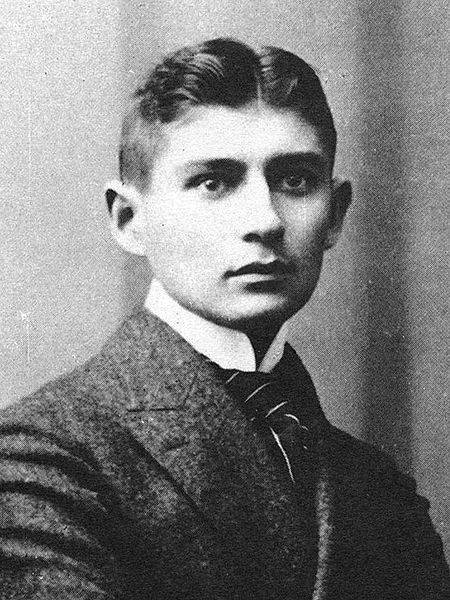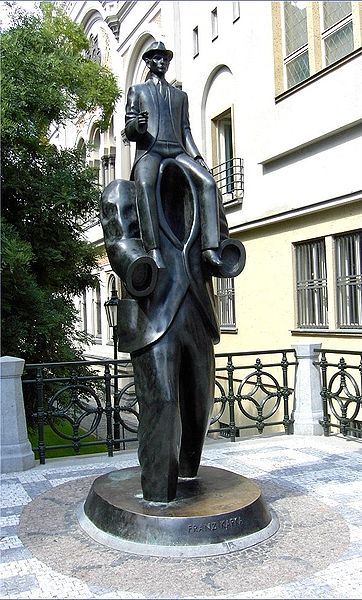<Back to Index>
- Mathematician Jesse Douglas, 1897
- Writer Franz Kafka, 1883
- 11th Prime Minister of Canada Richard Bedford Bennett, 1870


Franz Kafka (3 July 1883 – 3 June 1924) is one of the most important and influential fiction writers of the early 20th century; a novelist and writer of short stories whose works, only after his death, came to be regarded as one of the major achievements of 20th century literature.
He was born to middle-class German-speaking Jewish parents in Prague, Bohemia, now part of the Czech Republic, in what was then the Austro-Hungarian Empire. The house in which he was born, on the Old Town Square next to Prague's Church of St Nicholas, today contains a permanent exhibition devoted to the author. Kafka's work— the novels The Trial (1925), The Castle (1926) and Amerika (1927), as well as short stories including The Metamorphosis (1912) and In the Penal Colony (1914) — is now collectively considered to be among the most original bodies of work in modern Western literature. Much of his work, unfinished at the time of his death, was published posthumously.
Kafka was born into a middle-class Jewish family in Prague, the capital of Bohemia. His father, Hermann Kafka (1852–1931), was described as a "huge, selfish, overbearing businessman" and
by Kafka himself as "a true Kafka in strength, health, appetite,
loudness of voice, eloquence, self-satisfaction, worldly dominance,
endurance, presence of mind, [and] knowledge of human nature". Hermann
was the fourth child of Jacob Kafka, a ritual slaughterer, and came to Prague from Osek, a Czech-speaking Jewish village near Písek in
southern Bohemia. After working as a traveling sales representative, he
established himself as an independent retailer of men's and women's
fancy goods and accessories, employing up to 15 people and using a jackdaw (kavka in Czech) as his business logo. Kafka's mother, Julie (1856—1934), was the daughter of Jakob Löwy, a prosperous brewer in Poděbrady, and was better educated than her husband. Franz was the eldest of six children. He
had two younger brothers: Georg and Heinrich, who died at the ages of
fifteen months and six months, respectively, before Franz was seven;
and three younger sisters, Gabriele ("Elli") (1889–1941), Valerie
("Valli") (1890–1942), and Ottilie ("Ottla") (1892–1943). On business
days, both parents were absent from the home. His mother helped to
manage her husband's business and worked in it as much as 12 hours a
day. The children were largely reared by a series of governesses and
servants. Franz's relationship with his father was severely troubled as
explained in the Letter to His Father in which he complained of being profoundly affected by his father's authoritative and demanding character. During World War II, Franz's sisters were sent with their families to the Łódź Ghetto and died there or in concentration camps. Ottla was sent to the concentration camp at Theresienstadt and then on October 7, 1943 to the death camp at Auschwitz, where 1267 children and 51 guardians, including Ottla, were gassed to death on their arrival. Kafka's first language was German, but he was also fluent in Czech. Later, Kafka acquired some knowledge of French language and culture; one of his favorite authors was Flaubert. From 1889 to 1893, he attended the Deutsche Knabenschule, the boys' elementary school at the Masný trh/Fleischmarkt (meat market), the street now known as Masná street. His Jewish education was limited to his Bar Mitzvah celebration at 13 and going to the synagogue four times a year with his father, which he loathed. After elementary school, he was admitted to the rigorous classics-oriented state gymnasium, Altstädter Deutsches Gymnasium, an academic secondary school with eight grade levels, where German was also the language of instruction, at Old Town Square, within the Kinsky Palace. He completed his Maturita exams in 1901. Admitted to the Charles-Ferdinand University of
Prague, Kafka first studied chemistry, but switched after two weeks to
law. This offered a range of career possibilities, which pleased his
father, and required a longer course of study that gave Kafka time to
take classes in German studies and art history. At the university, he
joined a student club, named Lese- und Redehalle der Deutschen Studenten, which organized literary events, readings and other activities. In the end of his first year of studies, he met Max Brod, who would become a close friend of his throughout his life, together with the journalist Felix Weltsch,
who also studied law. Kafka obtained the degree of Doctor of Law on 18
June, 1906, and performed an obligatory year of unpaid service as law
clerk for the civil and criminal courts. On November 1, 1907, he was hired at the Assicurazioni Generali,
a large Italian insurance company, where he worked for nearly a year.
His correspondence, during that period, witnesses that he was unhappy
with his working time schedule — from 8 p.m. (20:00) until 6 a.m.
(06:00) — as it made it extremely difficult for him to concentrate on his
writing. On 15 July 1908, he resigned, and two weeks later found more
congenial employment with the Worker's Accident Insurance Institute for the Kingdom of Bohemia. The job involved investigating personal injury to
industrial workers, and assessing compensation. His father often
referred to his son's job as insurance officer as a "Brotberuf",
literally "bread job", a job done only to pay the bills. While Kafka
often claimed that he despised the job, he was a diligent and capable
employee. He was also given the task of compiling and composing the annual report and
was reportedly quite proud of the results, sending copies to friends
and family. In parallel, Kafka was also committed to his literary work.
Together with his close friends Max Brod and Felix Weltsch,
these three were called "Der enge Prager Kreis", the close Prague
circle, which was part of a broader Prague Circle, "a loosely knit
group of German-Jewish writers who contributed to the culturally
fertile soil of Prague from the 1880s till after World War I." In 1911, Karl Hermann, spouse of his sister Elli, asked Kafka to collaborate in the operation of an asbestos factory
known as Prager Asbestwerke Hermann and Co. Kafka showed a positive
attitude at first, dedicating much of his free time to the business.
During that period, he also found interest and entertainment in the
performances of Yiddish theatre,
despite the misgivings of even close friends such as Max Brod, who
usually supported him in everything else. Those performances also
served as a starting point for his growing relationship with Judaism. In 1912, at Max Brod's home, Kafka met Felice Bauer, who lived in Berlin and worked as a representative for a dictaphone company.
Over the next five years they corresponded a great deal, met
occasionally, and twice were engaged to be married. Their relationship
finally ended in 1917. In 1917, Kafka began to suffer from tuberculosis,
which would require frequent convalescence during which he was
supported by his family, most notably his sister Ottla. Despite his
fear of being perceived as both physically and mentally repulsive, he
impressed others with his boyish, neat, and austere good looks, a quiet
and cool demeanor, obvious intelligence and dry sense of humor. Kafka developed an intense relationship with Czech journalist and writer Milena Jesenská. In July of 1923, throughout a vacation to Graal-Müritz on the Baltic Sea, he met Dora Diamant and
briefly moved to Berlin in the hope of distancing himself from his
family's influence to concentrate on his writing. In Berlin, he lived
with Diamant, a 25-year-old kindergarten teacher from an orthodox
Jewish family, who was independent enough to have escaped her past in
the ghetto. She became his lover, and influenced Kafka's interest in the Talmud. It is generally agreed that Kafka suffered from clinical depression and social anxiety throughout his entire life. He also suffered from migraines, insomnia, constipation,
boils, and other ailments, all usually brought on by excessive stresses
and strains. Recent research into Kafka's migraine headaches has
suggested that he may have suffered from cluster headaches,
also referred to as "suicide headaches", a recurring and debilitating
neurological condition triggering frequent headaches, characterized by
one of the highest degrees of pain known to medical science. He attempted to counteract all of this by a regimen of naturopathic treatments. However, Kafka's tuberculosis worsened; he returned to Prague, then went to Dr. Hoffmann's sanatorium in Kierling near Vienna for
treatment, where he died on June 3, 1924, apparently from starvation.
The condition of Kafka's throat made eating too painful for him, and
since parenteral nutrition had
not yet been developed, there was no way to feed him. His body was
ultimately brought back to Prague where he was buried on June 11, 1924,
in the New Jewish Cemetery (sector 21, row 14, plot 33) in Prague-Žižkov.